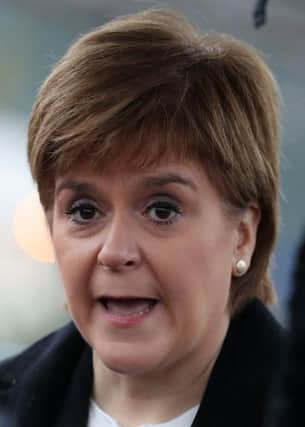Will Nicola Sturgeon raise income tax in Scottish Budget?


In Scotland, however, attention turned almost immediately after the Chancellor had resumed his seat to the Scottish Budget next month.
Far more than his UK counterpart, Derek Mackay’s hard work begins after he finishes his statement to parliamentary colleagues, not before.
Advertisement
Hide AdAdvertisement
Hide AdMinority government in Scotland’s parliament means that Mr Mackay, the SNP’s Finance Secretary, will have his work cut out persuading at least some opposition members to vote for his package of measures.
Chief among the items on the agenda will be Scotland’s rate of Income Tax, which the SNP has the power to raise.
A furious row has broken out at the mere prospect of a potential tax rise, and we look at just how likely that is.
‘Extra Money’
The main political bulwark against any potential rise in income tax, are Ruth Davidson’s Scottish Conservatives, the main opposition party in Holyrood.
Emboldened by that second place finish in the 2016 election, and a similarly successful showing in the June poll, they are keen to flex their muscles in opposition and Government.
They were boosted by being praised by the Chancellor yesterday, and wasted no time in claiming that all that appeared good in the budget yesterday for Scotland was down to them.
Top of the list of achievements that the 13 Tory MPs are touting is the ‘extra’ £2bn in funding that Philip Hammond announced for the Scottish Government.
Ruth Davidson, armed with that figure, is using it as her chief weapon to attack the notion that income tax could rise.
Advertisement
Hide AdAdvertisement
Hide AdThe SNP, for their part, say that the Chancellor’s announcement is a ‘smokescreen’ and a ‘con’ – as they touted Scottish Parliament Information Centre figures that show that, in real terms, Scotland’s bloc grant falls slightly as of next year.
The ‘plan’
Nicola Sturgeon hasn’t confirmed any change to Scotland’s income tax bands or rates, but the party insists that the ‘time is right’ to reconsider the role of tax.
The SNP says that four tests (to avoid cuts, protect low earners, support the economy, and make tax more progressive) will need to be met if any changes are to pass muster.
Four proposals were put forward by the party earlier this month, with options ranging from adding extra bands to increasing taxes on some existing bands.
None of the proposals affect the basic rate for those earning below the median wage of £24,000 a year, which is perhaps the most politically significant part of the SNP plans.
The hard sell
Again, even if Derek Mackay settles on one of these plans to raise income tax, he will find himself with a difficult period of negotiating with the other parties in the Scottish Government.
Given their current antagonistic relationship, it is easy to forget that as recently as 2010, the SNP were relying on the Tories for votes to pass their annual budgets.
Nothing should shock us these days in politics, but it is safe to say that there is virtually no chance of Nicola Sturgeon and Ruth Davidson shaking hands on a budget deal any time soon.
Advertisement
Hide AdAdvertisement
Hide AdLabour’s position might be slightly unclear until Richard Leonard puts his new shadow cabinet in place, but it also seems unlikely that Labour will sign up for tax rises that, by most measures, would affect a slight minority of the population.
The best hope for the SNP to get their tax plans over the line is, therefore, the Scottish Greens, the party that Ruth Davidson used her post-Budget media appearances to accuse Nicola Sturgeon of being in-hoc to.
That is an image that the First Minister will be keen to avoid projecting, and she could also face negotiating with a party that could think that the plans the Tories call a ‘tax hike’ actually don’t go far enough.
Most observers, however, believe that Patrick Harvie and his colleagues will come round.
The exact nature still remains all clear, but it is apparent that after December 14, many Scots will face the prospect of paying more of what they earn to the taxman.
